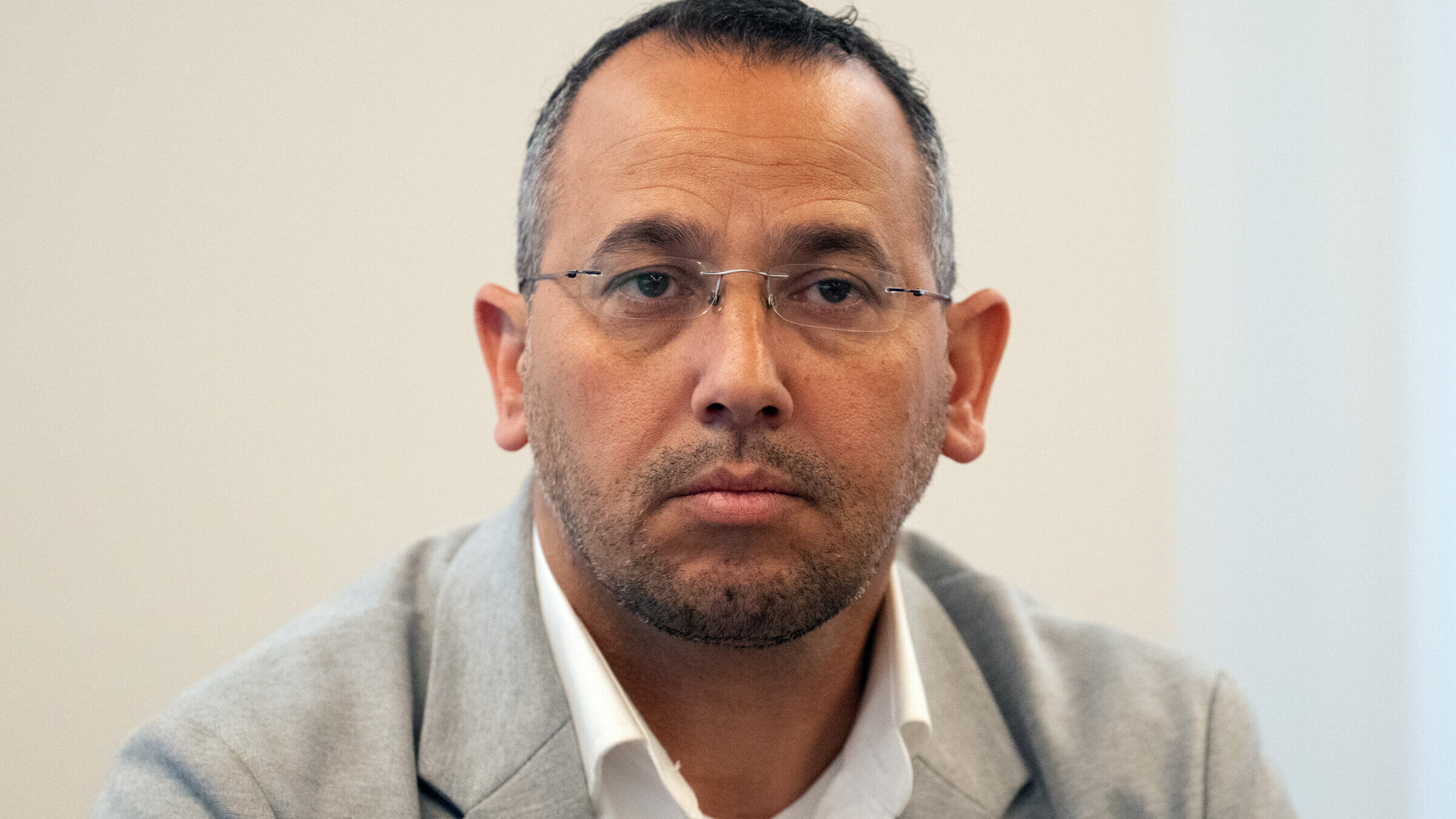How a hostage’s brother became a hero in Israel
With passion, eloquence and perseverance, Sharon Sharabi has reminded us of the human cost of this horrible war

Sharon Sharabi, brother of Eli Sharabi, at a press conference. Photo by Getty Images
Sharon Sharabi is not stopping. The brother of recently released hostage Eli Sharabi has become a symbol in Israel. Night after night, Sharon appeared on television, reminding everyone why we need to bring all the hostages home. His dignity and beautiful phrasing in an impossibly horrible situation have been something to cling to when many have lost faith in the leadership of the country.
With every measured sentence, Sharabi, who is 48, radiates strength, seriousness of purpose, and yes, hope.
This is a man and a family that has suffered the unimaginable. Sharon’s brother Yossi was also kidnapped by Hamas and was declared dead in captivity. But Sharon held out hope for Eli’s survival. He kept saying “Eli chazak,” or Eli is strong. It was a mantra that stayed in my head, and while Sharon Sharabi had hoped his brother would hear him, we now know that Eli Sharabi had zero access to media in his time in captivity.
Eli also had zero access to accurate information. On Oct. 7, Eli’s British-born wife and his two teenage daughters were murdered by Hamas, but Eli did not know it.
“What kept him going was this responsibility he felt, to return to his wife and children,” Sharon Sharabi said. “Every day he said sh’ma yisrael. And from the first minute he landed back to Israel he wanted to thank the people of Israel who fought for him.”
When Eli, who is 52, was finally released, emaciated and weak, his Hamas captors forced him to say on stage that he was looking forward to seeing his wife and daughters.
Then the gunmen laughed.
They knew they had killed the three women.
But Sharon Sharabi was not laughing. All of Israel was not laughing. And just because his brother was free, Sharon Sharabi — the only one of three very close brothers not to be taken into Hamas captivity — was not stopping with his campaign to get every hostage home.
This is the kind of thing that is not reported outside of Israel. Naama Levy’s grandfather was out protesting the morning after her release; Levy was one of the young women released early in this ceasefire deal. So perhaps I should not have been surprised to see Sharabi on television, well-dressed and serious, a man with a purpose, when his beloved brother Eli was already back.
“You’re like a ben bayit here,” anchor Niv Raskin of News Channel 12 said by way of greeting Sharabi last night.
Sharabi has indeed become like a member of the family. Raskin was noting that it was almost as if Sharabi lived there, as if the news station was his home.
Sharon Sharabi has been a guest on so many news programs, that it almost feels like he is a working journalist. But Sharabi’s power comes from the fact that he’s family and refuses to let that power go.
I have also been struck by Sharabi’s faith. Sharon greeted his brother Eli wrapped in a tallit, and said the sh’ma prayer immediately. Sharon Sharabi, in a kippah, well-dressed, articulate, has become a magnificent spokesman for sane religious people in Israel.
The fact that his brother returned was a nes galui, Sharon Sharabi said last night. A revealed miracle. A miracle in plain sight.
“And just a little longer he would not be alive,” Sharon Sharabi said. “We have to rush, and if we wait, they may not return. We will pound our chests with al chet.”
Al chet is religious language, invoking the Yom Kippur service of cataloguing sins while beating our chests. It’s a prayer of personal responsibility and communal responsibility, and Sharabi was reminding the audience of both.
“What did he tell you?” Raskin wanted to know. He wanted to understand what Eli was saying about captivity. Aggressive in a good way, Raskin has been interesting to watch; a former sports journalist, he brings his intense curiosity to every aspect of this horrible war.
Well, Sharon Sharabi said, he always knew that Hamas captivity was not a keitana — it wasn’t summer camp. But it was clear that the horrors Eli experienced were not something Sharon Sharabi had imagined, even in his worst nightmares.

Sharon Sharabi said the real people who need to see Eli and speak with him are “the mekablei hachlatot,” the decision-makers, “because the hostages don’t have time.”
Footage of the three emaciated male hostages was shown on a loop as Sharabi and Raskin talked. Headlines blared. The men were bound, the headlines said; one was barefoot for nearly 500 days. Several lost the ability to walk because they were not allowed to. It is now clear that Hamas has been torturing hostages, burning them, brutalizing them. And apparently, the released men were in better shape than some of the hostages still there. The worst part of the newscast was the wailing of mothers of young male hostages who recently found out just how bad their sons’ conditions are.
The drama and pain of last night stayed with me. Anchor Niv Raskin handed brother Sharon Sharabi a handkerchief to wipe away the tears when they replayed the moment of reunion. It is this personal connection that American news media does not have.
Raskin asked Sharon how all this affected him.
“To know that Eli is the last remnant, that you have to go to every room in Israel and the world and to say, I am not leaving here without Eli,” he said “It’s been exhausting. It takes powers from you that you didn’t know you had. And I think of my family, which is the hostage families. Every day you have to build hope, that today is the day.
Sharon Sharabi also had praise for the people of Israel: “This nation has shown that it has a spine. I am so happy to be a Jew, with people who don’t abandon me for a moment.”
This is the way this brother who has lost four relatives to Hamas and is now faced with the rehabilitation of his older brother — emaciated and tortured — lifts up the audience every night. He refers to all the hostage families as his family. And he directly appeals to the sense of peoplehood in Israel.
He never lets anyone forget that he did not forget his brother for one second.
And last night Sharon Sharabi asked to address the camera and speak to Eli directly, on live television.
“You are a gibor Israel” — a hero of Israel, a brave man of Israel —”in the way you walked, in your leadership there. When you returned, you insisted on being wrapped in the flag of the State of Israel,” Sharon Sharabi said. “And the first sentence you said was thank you to this nation. I want to say to you that your hope and your emunah” — your faith — “are what took you out of the gehenom — the hell — that you experienced,” Sharon Sharabi said.
When the anchor Niv Raskin said “you are a rare man, and I love you,”I felt he was speaking for all of Israel.
“We became friends over this time,” Raskin said.
“Thank you for not abandoning us,” Sharon Sharabi said.
All of Israel will have to learn to function again, after this terrible war. But new leaders are making themselves known — including families of hostages. In the English-speaking world, Jon Polin and Rachel Goldberg-Polin have made their mark. In the Hebrew-speaking world, Sharabi has shown everyone how to be a brother, and how to be part of the Jewish people.















